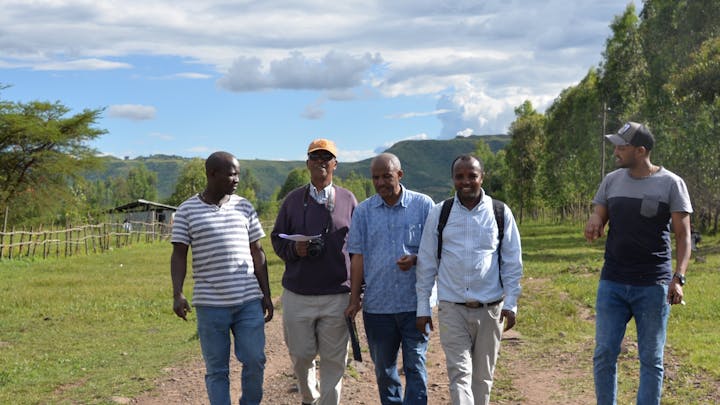If we do what people can do themselves, we do not strengthen them

In relation to the annual Wilde Ganzen Day in March 2023, we welcomed a guest from Ethiopia. In the timespan of a week, Yehalem Abebe of Partners in Education Ethiopia shared his knowledge and experience on working with communities. And he was very adamant: “If we do what people can do themselves, we do not strengthen them, we only weaken them.” In other words, look first at what the people have and can do themselves and, if necessary, supplement that.
Start from what is there
We must get rid of the idea that poor people don’t have anything. Some people have a lot, others have little. However, every community has ‘assets’ that people can deploy. Yehalem believes that, although there may not be much money available in communities, there are all sorts of things that can be turned into money: community land, sand, agricultural products. This can be sold to benefit the community or a project.
Yet, perhaps even more important than this economic capital is social capital. People have huge social networks. Old classmates, distant relatives, the son of the old neighbour who now runs a business in the city twenty kilometres away, the pastor or imam, the traditional leaders, a former fellow villager who has moved abroad. Networks are extensive and diverse.
By utilising this social capital, a community can gain access to money, but also (especially) to knowledge, experience and even larger networks. By mobilising these networks, people can achieve a lot.
Help people get organised
I once read an African proverb; ‘When spiderwebs unite, they can tie up a lion’. In other words: together we are strong. Many communities possess all kinds of structures in which people have organised themselves, from women’s groups and savings groups to groups from the church or a village council of village elders. However, if necessary, a local organisation can help people organise themselves (better).
In the villages where Partners of Education is active, there is a committee that oversees the entire project. In addition, there are sub-committees. They assign tasks: ‘You belong to the class of 1999, it is now up to you to track down all your old classmates, find out how they can mean something and then ask them’. A committee can also have direct contacts with the (local) government and lobby there for the project. A community that is well organised can tackle this particular project but can also face other challenges in the future.
Poor people have priorities too
The final lesson of Yehalem; poor people too have priorities. For them it is not a question of ‘Do I buy that car or go on that expensive holiday’, but perhaps it is about: ‘If I let my child go to secondary school, I won’t have money to fix the roof’.
When I lived in Cameroon, I also sometimes worried about parents who said they had no money for a school uniform, but who I saw drinking beers at the local bar every night. Apparently, in that moment they thought that was more important.
Therefore, Yehalem advises checking who thinks the project is important. Is it mainly the Dutch foundation, or the local organisation, the local leaders, or really the people themselves? As long as the target group doesn’t actually see the problem as such, or doesn’t support the solution, it becomes difficult to really develop the project sustainably, according to Yehalem. Is the community not (really) behind it (yet)? Then he thinks it would be wise to first spend time creating support for both the problem and the solution. Or maybe the community has much better ideas for projects that you can take up together!
It may take more time to really involve the community in the projects, to organise and mobilise them. However, together you are stronger, also in facing the future!
Want to read more about the work of Yehalem and his organisation Partners in Education? Then also read this blog on local fundraising.
And do you want to learn more about community engagement? Also read the white paper!
